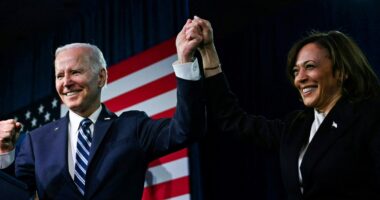WASHINGTON — Democrats set a timeline on Tuesday to move ahead with a sweeping infrastructure and jobs bill that doesn’t require Republican support, making clear they believe a bipartisan deal, if struck, would not sufficiently deliver on President Joe Biden’s top legislative priorities.
The process would enable Democrats to avoid the 60-vote threshold in the Senate but doesn’t guarantee they will be able to pass the sweeping $4 trillion proposal Biden asked for. Still, it could pave the way for them to put a major piece of legislation on his desk.
And in attempting a bill that requires the support of all 50 Democrats in the Senate, the president’s party faces a major test as to whether they can keep their whole caucus in line.
Senate Majority Leader Chuck Schumer, D-N.Y., told reporters he will convene a meeting Wednesday of Budget Committee members to discuss crafting a budget resolution — the only way Democrats can bypass a GOP filibuster — to vote on in July.
He added that bipartisan talks would continue to try to find a deal with Republicans.
“One track is bipartisan and second track pulls in other elements of Biden’s American Job Plan, and American Families Plan, which will be considered even if it doesn’t have bipartisan support,” Schumer said.
The two most conservative Democrats haven’t said how they’d vote, but they notably kept the door open to Schumer’s two-track approach.
“I’d like to make sure that both of them get a fair look,” Sen. Joe Manchin, D-W.Va., said.
A spokesperson for Sen. Kyrsten Sinema, D-Ariz., said she is still talking with colleagues and the administration about the way forward, but didn’t rule out a partisan bill: “Kyrsten will give careful consideration to any idea that can strength Arizona’s economy.”
Manchin and Sinema are part of the bipartisan group of 10 senators trying to negotiate a $579 billion agreement to fund physical infrastructure projects.
Some progressive Democrats, including Senate Budget Chair Bernie Sanders, I-Vt., and Sen. Ed Markey, D-Mass., also drew hard lines this week, saying they won’t vote for a bill that excludes priorities like mitigating climate change.
“There’s a strong sentiment within the caucus that the bipartisan bill and a reconciliation bill has to be chained together with a lock that cannot be broken,” Sen. Tina Smith, D-Minn., told reporters. “Got to make sure the caucus is all together on both.”
‘The clock is ticking’
White House counselor Steve Ricchetti attended a House Democratic caucus meeting Tuesday and told lawmakers that the next 7-10 days could lead to a decision on how to proceed on infrastructure, multiple attendees said.
“Obviously, the clock is ticking. Nobody wants to do the stall-until-we’re-doomed-approach,” said Rep. Peter Welch, D-Vt. “What I hear is that they are: a) sincere about wanting a bipartisan deal; b) they don’t want to talk forever.”
A White House official emphasized that Ricchetti was not imposing a firm deadline.
“He said that we are certainly going to know where things stand on infrastructure talks generally in the next week to 10 days, and that we can then take stock overall,” the official said.
Rep. Richard Neal, D-Mass., the chair of the tax-writing House Ways and Means Committee, voiced skepticism about the $579 billion framework offered by the bipartisan group of 10 senators.
“I think we need more than that,” he said, calling this moment “a unique opportunity to go bigger.”
He said GOP cooperation would be good but wasn’t necessary.
“Trying to exhaust every opportunity for finding common ground makes a good deal of sense, but at some point in legislative life, reality settles in. And if you can’t do it, then you want to be prepared to go to the process of reconciliation,” Neal told NBC News on Tuesday.
Top Senate Republicans split on whether Democrats’ pursuit of a party-line bill would damage prospects of a bipartisan deal.
“It’s a bad idea,” said Sen. Joni Ernst, of Iowa, a member of Senate GOP leadership. “That sends a signal that he really doesn’t want to do a bipartisan bill. I think it just makes us upset.”
One of the biggest sticking points in the $579 billion infrastructure plan is how to pay for it. Republicans are dead set against raising taxes and Senate Minority Leader Mitch McConnell has the ability to deliver significant votes or sink legislation with this opposition.
But Senate Minority Whip John Thune, R-S.D., said that if Republicans ink a bipartisan deal they could make it tougher for Democrats to secure the votes for a separate party-line bill.
“You can make the argument that if there’s a bipartisan deal on the infrastructure pieces, and all that’s left is voting for the tax increases and all the social spending — that it’d be hard to get some of those moderate Democrats to be for that,” he said. “So you can argue both ways. There’s some argument that they’re going to do all this other stuff anyway, why give them a win on this?”
For Schumer, a party-line bill would be another major test of his abilities to keep his ideologically diverse caucus unified in the face of what is likely to be aggressive GOP opposition. He vowed after a meeting Tuesday that Democrats would stick together behind Biden’s economic plans.
“There was a total agreement that we must have unity and get it done,” he said.
Garrett Haake, Haley Talbot, Julie Tsirkin and Frank Thorp V contributed.
Source: | This article originally belongs to Nbcnews.com











